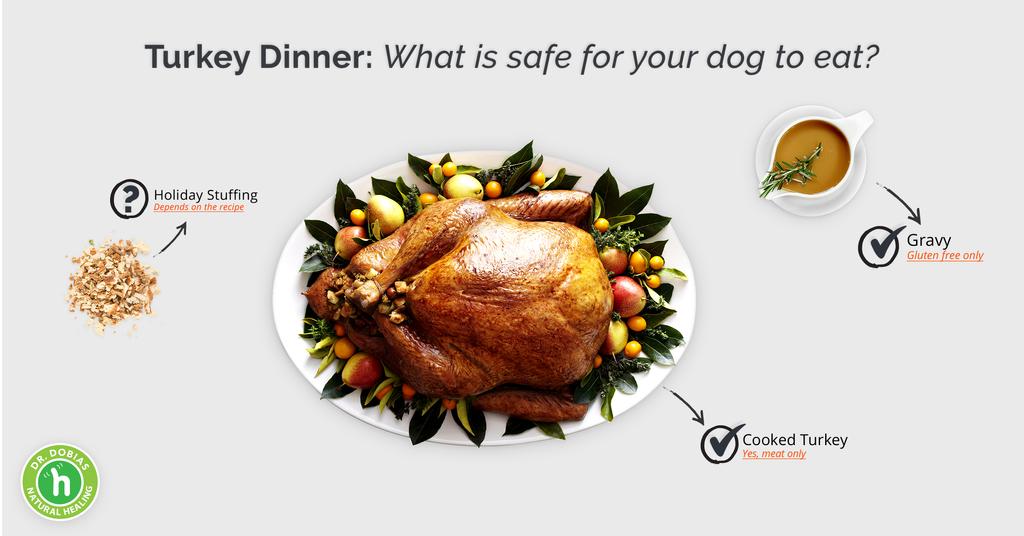I Wish I Was a Dog is back with another insightful article to help pet owners navigate the holiday season. In this article, we will share a simple list of turkey dinner items that your furry friend can enjoy and those that are best avoided. So, let’s dive in and make this holiday season extra special for our four-legged companions!

What You Need to Know about Turkey Dinner for Your Dog
As a long-time raw and cooked diet advocate for dogs, I understand the importance of providing a wholesome diet for our furry friends. That said, I also believe that holidays are a time to indulge and make memories with our loved ones, including our dogs. So, let’s explore the dos and don’ts of sharing a turkey dinner with your pup.
To make things easier, I have color-coded each item on the list to help you navigate your dog’s holiday feast:
- GREEN: These items are safe and can be enjoyed by your dog.
- YELLOW: These items are safe in small amounts.
- RED: Although non-toxic, these items are best avoided.
- PURPLE: Exercise caution as these items can be toxic to dogs.
1. Turkey Meat
If you’re a meat eater, your dog is in luck! The skin, white and dark meat, and giblets are all safe and delicious choices to include on your dog’s plate. So go ahead and let your pup indulge in some succulent turkey goodness!
2. Cooked Turkey Bones
It’s essential to remember that dogs should never be given cooked bones. The cooking process makes bones indigestible and can lead to intestinal obstruction. However, if your dog accidentally gets hold of cooked bones, you can try feeding them cooked squash with a sprinkle of steeped flaxseed to help ease any potential digestive issues.
3. Stuffing
Unfortunately, turkey stuffing is off the menu for our furry friends. Here’s why:
- Bread: Grains are not suitable for our canine companions.
- Onions and Chives: These ingredients are toxic to dogs and can cause anemia.
- Raisins: These pose a high risk of renal failure in dogs and should be avoided at all costs.
- Almonds: While not toxic, it’s best to avoid giving your dog almonds as a snack or treat.
4. Spices
When it comes to spices, moderation is key. Here’s what you need to know:
- Salt: Contrary to popular belief, a moderate amount of salt in your dog’s turkey dinner is perfectly fine. Just remember to use natural sea salt and reduce the amount considering your dog’s needs.
- Pepper: Pepper can be safely included in your dog’s meal in moderate amounts.
- Sage: This spice is non-toxic to dogs and can add flavor to your stuffing.
- Rosemary: While safe in small amounts, it’s generally not recommended for pregnant females due to its effect on uterine contractility.
- Garlic: Small amounts of garlic are generally safe, but larger amounts can be toxic to a dog’s red blood cells. Exercise caution when using garlic in your dog’s meal.
5. Vegetables
Let’s explore which vegetables are a go and which ones to avoid:
- Potatoes: While only the roots and leaves of potatoes are toxic, they are not considered a species-appropriate food for dogs.
- Yams and Sweet Potatoes: These are a healthy and tasty addition to your dog’s turkey dinner.
- Brussels Sprouts: Cooking eliminates the goitrogenic effect of Brussels sprouts, making them safe for your dog’s festive meal.
- Green Beans: Whether raw or cooked, green beans are a definite ‘yes’ for your dog’s meal.
- Winter Squash: While not a popular choice for doggy chewing, cooked winter squash can be a great addition to both you and your dog’s turkey dinner.
6. Condiments
Let’s talk about those delicious finishing touches to your holiday meal:
- Gravy: Traditional gravy contains flour and a high salt content, making it less than ideal for dogs. If you choose to use gravy, opt for a gluten-free recipe and use it sparingly. But don’t worry, your dog will love the festive dinner either way!
- Cranberry Sauce: While cranberries themselves are good for dogs, the added sugar in cranberry sauce puts it in the yellow zone. It’s okay in small amounts, but your dog will be just as happy without it.
- Marshmallows: These sweet treats, commonly used in sweet potato casseroles, should be avoided as they are full of sugar and starch.
7. Dessert
Now, let’s discuss the tempting desserts that may be on the menu:
- Pumpkin Pie Filling: While pumpkin is great for treating diarrhea in dogs, pumpkin pie filling contains milk and sugar, which are not recommended for our furry friends.
- Mincemeat: This pie filling contains raisins, which are toxic to dogs. It’s best to keep mincemeat away from your pup’s reach.
- Pumpkin Pie Crust: The large amount of flour and fat in pie crusts can upset your dog’s digestive tract. Dogs are not designed to digest sugars and complex carbohydrates, so it’s best to avoid giving them pie crusts.
- Fruit Pie Filling: It’s generally advised to avoid giving fruit to dogs close to or after a protein-rich meal. However, let’s be honest, no dog would choose pie over turkey!
- Pecans and Pecan Pie: Nuts are generally not recommended for dogs and can cause digestive issues. Luckily, most dogs aren’t particularly fond of nuts anyway.
- Ice Cream and Whipped Cream: While dairy is not ideal for dogs, a small scoop of ice cream or whipped cream won’t do harm. Remember, a little indulgence won’t hurt anyone!
Wishing you and your furry friend a happy holiday season filled with love, joy, and safe and delicious treats!
© Dr. Peter Dobias, DVM



